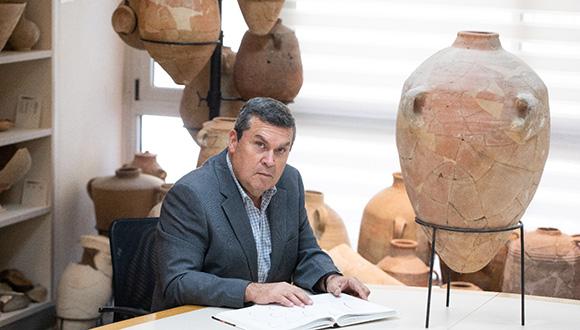Prof. Oded Lifshitz, head The Nadler Institute of Archeology at the Lester and Sally Antin Faculty of Humanities, was announced as the winner of the A.M.T. (Art, Science, Culture) for 2022. The prize will be awarded to him in a ceremony to be held during the month of June, in the capacity of the Prime Minister of Israel.

Explorer of Great Empires
Prof. Lipshitz was born in Jerusalem, a city which and its surroundings are at the heart of his research. As part of his position at the university, he serves for over a decade as the head of the Institute of Archeology. He is in charge of the Austrian Chair for the Archeology of the Land of Israel in the Biblical Period, and is also the founder and director of the "Ancient Israel" program for master's and master's degrees. Since 2010 he has been managing the excavation expedition at Tel Azkah and since 2018 he has also been managing the excavations at the temple that was discovered at Tel Moza and dates back to the biblical period.
Prof. Lifshitz's works focus on the period of time of the "Age of Empires" - the period of rule of Assyria, Egypt, Babylon and Persia and its far-reaching effects on the areas of the southern Levant in general, and on Judea in particular. One of the great innovations led by Prof. Lipshitz is the recognition that, contrary to the conventional chronological view, the archeology and history of the Levant in most of the first millennium BC was shaped by the presence and rule of the great empires.
In a series of books and articles, he showed that on the one hand, the destruction of Jerusalem and the Temple that ended the days of the First Temple did not lead to a period of complete and complete exile from the land ("the myth of the empty land"), and that the "return to Zion" period is also to a large extent a reflection of the "myth of the mass return".
"Striving for excellence in the archaeological and historical research of the Land of Israel"
Besides his many publications, which became important cornerstones for the study of this period, another "building block" laid by Prof. Lifshitz is an innovative study of the administrative and economic traditions of Judah, mainly in the imprinting of seal impressions on the handles of jars, a tradition that began at the end of the eighth century, and continued until the middle of the century The second BC, during the entire period of the reign of the empires in Judah. In these studies, the continuity of the administration and the economy in Judah during the First and Second Temples, before and after the destruction of Jerusalem, was proven, during the 600 years between the reigns of Ahaz and Hezekiah until the establishment of the Hasmonean dynasty.
"This is a great honor both for me personally and of course for all of us in the Department and the Institute of Archaeology, the School of Jewish Studies and Archaeology, the Faculty of Humanities and Tel Aviv University, which has been my academic home since the beginning of my studies," said Prof. Oded Lifshitz excitedly and added "this is an important and significant recognition for striving for excellence in the archaeological and historical research of the Land of Israel, for many years of hard work and fruitful cooperation with friends and colleagues at the university and other universities in Israel and the world. Thank you to the award committee for choosing me, and of course to my friends and colleagues, my wife Yael and my four children, for the love and support throughout the years I have been engaged in excavations, research and writing."
